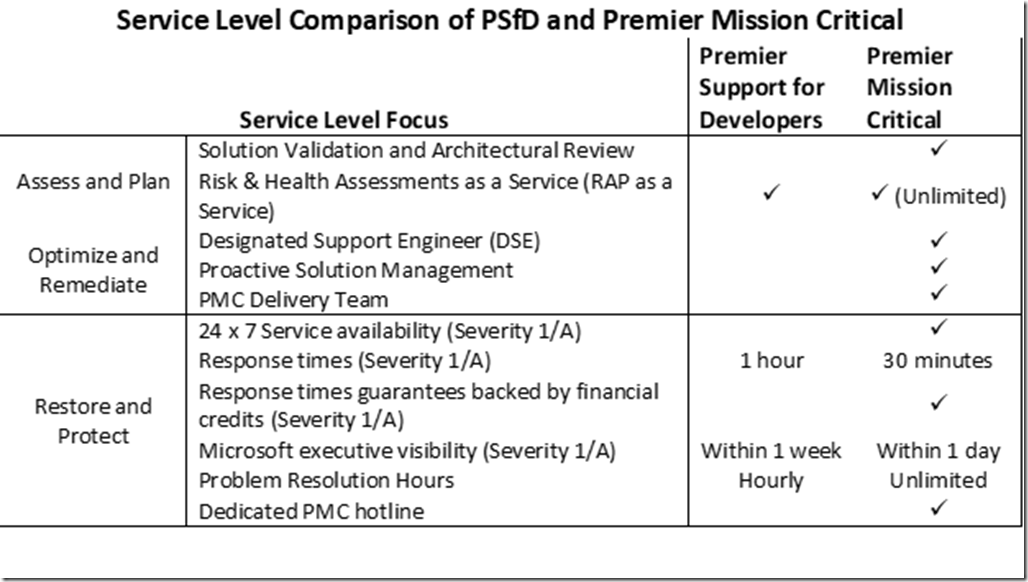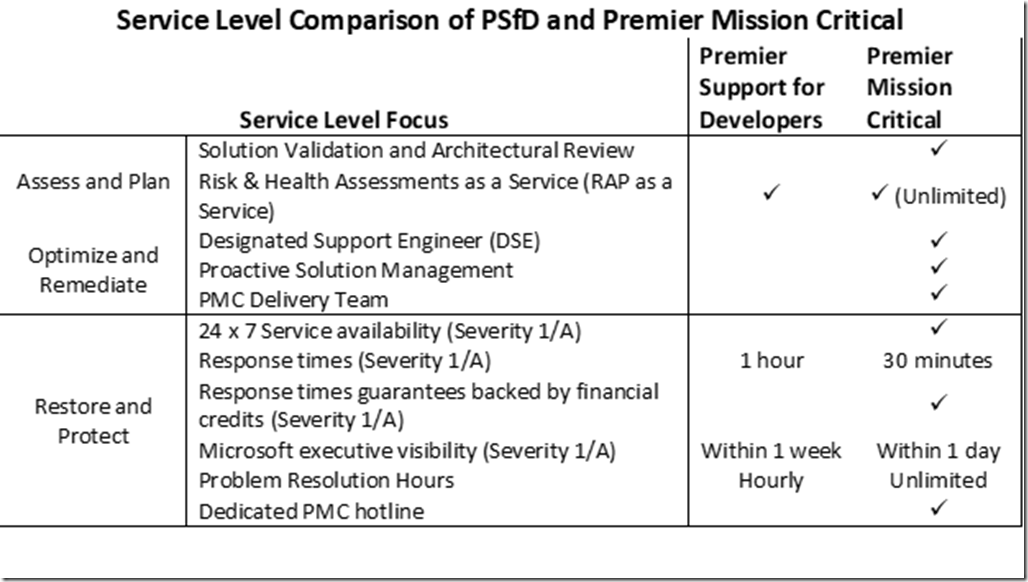In this post, Sr. Application Development Manager, Wyn Lewis-Bevan spotlights Premier Mission Critical Support.
So, you have a multi-million-dollar revenue generator that uses Microsoft supported technologies, either on Premise, in the Azure cloud, or both. Because it generates a significant portion of your company’s revenue and is therefore a mission critical application, you want to make sure it performs well and stays running during busy periods of your business. When things go downhill for whatever reason, you want high quality help from Microsoft with a fast response/resolution time.
If you are reading this article, you most likely already have Premier Support for Developers, or at least regular Premier Support. If that’s the case, you could open a Severity A or Severity 1 case and get Microsoft’s help. However, the engineer who picks up the case most likely doesn’t know very much, if anything about your application, it’s environment, or any of the details that would be helpful in determining how to get the issue resolved quickly. The trouble shooting will start with a collection of the basic data/info. If you have a major application in Azure, you may have an Azure Rapid Response (ARR) contract in place for that application. While the support engineer might know better about your application and environment, ARR is purely a reactive solution offering and doesn’t have the proactive support components. Premier Mission Critical shines when there is a definite need to go deeper into the proactive support of a specific application, as well has have the fast-reactive support of ARR.
What is PMC?
Premier Mission Critical, offers a well-rounded approach to both help customers maintain a specific application in production with unlimited service incidents (much like ARR) and the proactive support, to help guide the customer toward improving the application stability and/or performance by offering a series of carefully chosen proactive services.
The core PMC team consists of a PMC lead, a secondary and a solution Architect. The lead will be chosen based upon the perceived major pain point identified during the initial enrolment in the PMC program, the secondary will have depth in a second technology or area where expertise is likely needed. The solution architect will be familiar with the types of application architecture in the customer solution. The Application Development Manager (ADM) and a Dedicated Support Engineer (DSE) for your major technology are there to help with regular proactive activities, whether formal proactive services or ad-hoc consulting. In addition, other members of the PMC organization are available to be pulled in when their areas of expertise are required. Support cases may be driven by the PMC team, or in the case of a critical situation top engineers from 3rd Tier support will drive and own the issue with the help and backing of the PMC team.
Support cases are opened through a special phone number and support queue with Microsoft Customer Service and Support (CSS). For Severity A issues the SLA is 30 minutes for on Premise cases and 15 minutes for Azure cases (regular Premier Support Severity A SLA is 60 minutes.) ARR, CSS and PMC resources will join the call bridge with the customer. When necessary, the ADM will join side conversations with the customer to help with guidance and suggestions for the direction of the case and to help the customer make key decisions. Microsoft provides a dedicated bridge but customers often prefer to use their own bridge since they will already have it open their highest priority internal cases before engaging with CSS.
Proactive services, which make up much of the contract, are there to help guide the customer on a path toward a more stable application. Consisting of both formal and informal sessions, the proactive services make up most of the scope of a PMC engagement. Each agreement has a set of workshops, and other proactive services that are designed to help the customer improve the stability of their environment and thus help prevent outages. For example one of my customers has focused heavily on the unlimited RAP as a Service offering and on debug training for their support teams and advanced developers. Other services have included how to improve various aspects of their SQL Server topology. We also have offerings available to help improve operational practices, architectural improvements, etc. The list goes on. Below are a couple of tables that summarize the service level focus between the Premier and Premier Mission Critical and the Service Capabilities including Azure support.
Better Customer Satisfaction with PMC
Many customers have determined that PMC is, overall, a better offering than regular Premier Support and even ARR for their particular application or solution. The strong partnership that starts to form at the initial customer on-site kickoff and information gathering discussions helps define the relationship of both teams. The kickoff meetings consist of deep dives into the functionality, application workflow, operations etc., via discovery, optimization and supportability assessments. From these assessments, the PMC team gains a better understanding and forms a partnership with your core application and support teams to develop a successful outline of the application for reference during the execution of a support ticket as well as to carve out the proactive roadmap for the remainder of the contract period.
Recap
PMC consists of a highly-focused support team with knowledgeable CSS and ARR personnel on hand to provide rapid issue response, backed by a deep knowledge of the customer application/solution. The focus of PMC is to improve the stability of the application/solution by taking the knowledge gained through the assessments and the handling of the reactive issues and then providing a set of proactive service engagements. These are aimed at increasing the stability of the application/solution and increasing its resiliency and therefore lowers the risk of predictable outages during normal operation.
For more information on the PMC support program talk to your Microsoft ADM and visit https://www.microsoft.com/en-us/microsoftservices/premier-mission-critical-support.aspx where you can find some customer case studies and additional information.
Premier Support for Developers provides strategic technology guidance, critical support coverage, and a range of essential services to help teams optimize development lifecycles and improve software quality. Contact your Application Development Manager (ADM) or email us to learn more about what we can do for you.



0 comments